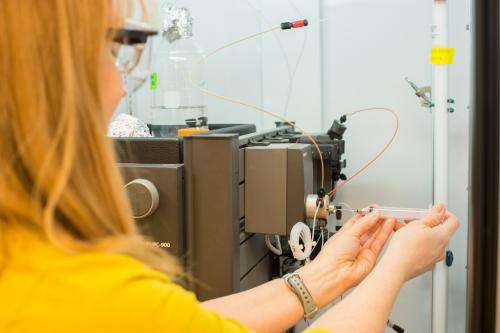Argonne biologist Rosemarie Wilton works on ways to stabilize antibodies, which tend to degrade over time.
Antibodies are often the first line of defense against the body's invaders. Built to recognize and attack foreign bacteria and viruses, antibody molecules are released by cells to do battle with microbial hostiles as part of the body's natural immune response.
Because antibodies are naturally so good at recognizing a host of different pathogens, Argonne biologist Rosemarie Wilton has spent much of her career working to better stabilize antibodies and prevent them from degrading over time.
In one possible scenario Wilton described, a soldier might want to use antibodies to detect any biological agents in the environment. However, in the high temperatures of the field environment, antibodies tend to degrade. Wilton and her colleagues have developed several methods to prolong the shelf life of antibodies.
Wilton and her colleagues at Argonne's Center for Nanoscale Materials have also begun to explore combining antibodies with inorganic nanoparticles that can selectively attack and destroy cancer cells.
In a third study—funded by the National Institutes of Health—Wilton and a collaborator at the University of Cincinnati are testing antibodies to prevent relapse in cocaine addicts. "By using antibodies, we're able to prevent addicts from getting high even if they happen to relapse and use cocaine, which hopefully makes it easier for them to kick the habit in the future," Wilton said. "The antibody binds to the cocaine molecule and prevents it from acting in the brain."
The anti-cocaine antibody study is especially promising because that particular antibody has a relatively long half-life—about three weeks, Wilton said.
Provided by Argonne National Laboratory




















